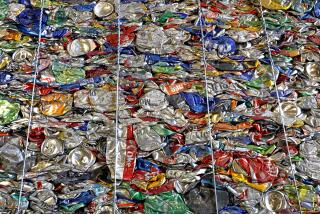Group Seeks Limit on New Liquor Sales : Alcohol: The coalition cites an increase in licenses for beer and wine outlets in Lancaster and Palmdale. It urges conditional use permits.
- Share via
A group pushing for local limits on new alcohol outlets in the Antelope Valley contends that the number of liquor stores, bars and convenience stores selling beer and wine is growing too fast.
The new group--the High Desert Alcohol Policy Coalition--said alcohol licenses in Lancaster increased by more than 12% between 1989 and 1990, a rate of growth that the group labeled alarming even considering the rapidly growing population in the city.
The number of such retail licenses in Palmdale went up by 9.5% during the same period, according to Ray Chavira, a resident of Lancaster who is chairman of the recently formed organization.
“Apparently, local city officials find it easier to tell kids to say no to other drugs, but find it hard to say no to booze merchants who want to push more of the drug implicated in the majority of cases in the death and injury of young Americans,” Chavira said.
The coalition wants Palmdale and Lancaster to develop a conditional use permit process similar to the one in the city of Los Angeles or to find another way to limit the availability of alcohol.
Before getting a license from the state Department of Alcohol Beverage Control, retail outlets in Los Angeles must receive a city permit. The procedure allows concerned citizens, police and other merchants to contribute their views on whether the permit ought to be granted. Criteria used by Los Angeles officials include the number of other alcohol outlets and the amount of crime in the area.
The city of Palmdale does not require most alcohol outlets to obtain a permit to operate in areas zoned for commercial use, a city planning official said.
The city of Lancaster requires mini-marts and convenience stores to obtain a conditional use permit, even if they do not sell beer or wine. But it does not require liquor stores, bars or restaurants serving alcohol to obtain a permit unless they also stage entertainment, such as music or dancing, and are located within 300 feet of a residential area, said Reyna Ortiz, a Planning Department official.
The most rapidly growing categories of alcohol outlets in Lancaster, according to ABC figures, included convenience stores, which increased 14.7% in the past year, and liquor stores, which were up 18.8%. Restaurants allowed to sell beer and wine rose by 26% and bars by 33%. In Palmdale, the fastest-growing categories of licenses included restaurants selling beer and wine, which increased 15%, and bars selling only beer, which grew by 50%.
The aim of the alcohol-policy group is “to create public awareness about the tremendous impact of alcohol availability on the life of a community, especially a fast-growing one, with lots of kids,” said Chavira, a county probation officer who has been involved in anti-alcohol campaigns at local, state and national levels.
“We’re concerned with the health and safety aspect of it because we don’t have enough law enforcement and other officials to mind the store and pick up the pieces,” he said.
Lancaster City Councilman George Theophanis, who has met with the coalition, said that according to ABC records there are 93 bars and other outlets selling alcohol in the downtown area.
“I wouldn’t want to see that spread out in the future to the west or east of the city,” Theophanis said. He added that the city is revising its General Plan to better control the location of businesses and is also trying to take over from the county the issuance of business licenses.
As the system operates, he said, the city is not told when a merchant who wants to sell alcohol applies for a business license or a state liquor license. “If we required a conditional use permit, we’d know before they got involved with the ABC and have a public hearing,” Theophanis said.
Other communities regard the conditional use permit process as a key tool for limiting such alcohol-related problems as drunk driving, loitering and public drinking. In the northeast San Fernando Valley, for example, community activists attend the public hearings in connection with the permit process and lobby for rejection of applications for new stores or bars. Homeowners in Van Nuys and Encino are also beginning to oppose additional alcohol outlets by protesting at the hearings.
More to Read
Sign up for Essential California
The most important California stories and recommendations in your inbox every morning.
You may occasionally receive promotional content from the Los Angeles Times.













